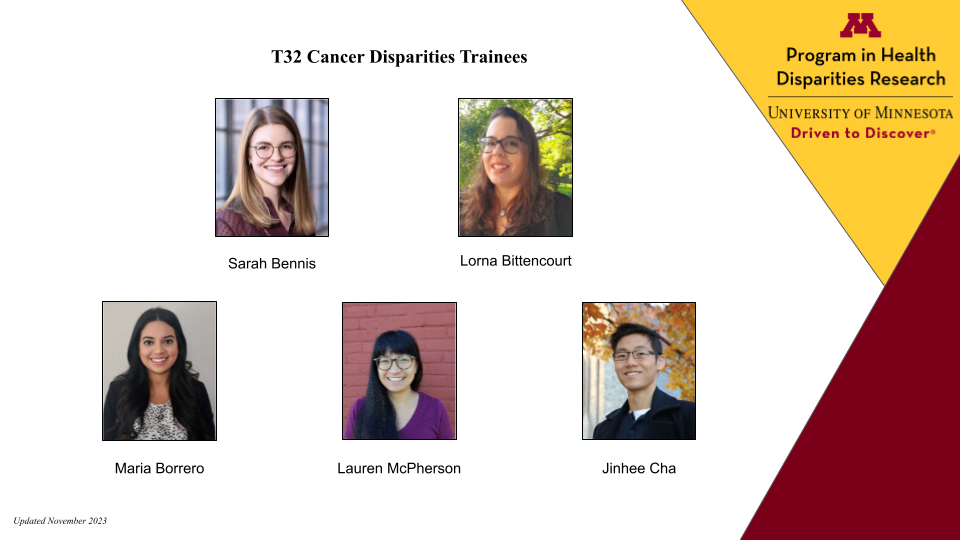T32 Cancer Disparities Training Program
The T32 Cancer Disparities Training Program currently has one postdoctoral position open!
Applications are being accepted on a rolling basis.
Learn more about the program below.

The T32 Cancer Disparities Training Program seeks to train researchers who are prepared to conduct community-engaged research to develop, test, and disseminate interventions in both clinical and community settings to reduce cancer-related health disparities among communities most impacted by inequities.
The program also intends to enhance the diversity of the research workforce in this area of study by specifically recruiting individuals from underrepresented or underresourced populations.
The program is innovative in focusing on education and experience in community-engaged research and on interventions to reduce cancer disparities. It's also innovative in mentorship, in which community members provide cultural mentoring and partnership in all aspects of research.
This T32 Cancer Disparities Training Program is a joint effort between the University of Minnesota Medical School and School of Public Health. It's funded by the National Cancer Institute, Grant T32 CA163184.
Program Experience
The program provides exceptional educational and career development opportunities.
Trainees will do the following:
- Engage in ongoing and independent research that focuses on developing, testing, and evaluating interventions in clinical and community settings to reduce cancer-related inequities among underrepresented and underresourced populations (broadly defined here to include race, ethnicity, immigration status, age, income, geography, gender, sexual orientation, etc).
- Receive interdisciplinary training through two required core courses: a monthly seminar and a writing workshop.
- Collaborate with a dynamic, federally funded, multi-disciplinary team of investigators (psychologists, physicians, epidemiologists, and statisticians) and with cultural community organizations that have a history of community-university research partnerships to address community-identified problems.
The program can be tailored to suit the trainee's training requirements with opportunities for teaching experience, clinical and community-based work, authorship on relevant manuscripts, collaborative grant writing experience, and rigorous independent grant submission. There is also support for conference travel and other training experiences.
Eligibility
- Applicants must be U.S. citizens, U.S. non-citizen nationals, or U.S. permanent residents.
(Individuals on temporary or student visas are not eligible for Kirschstein-NRSA support). - Preferred candidates will have experience working with community-based organizations.
- Interest and experience within cancer-related health disparities research is preferred.
- Criteria for selection of all fellows include academic performance and a career orientation toward independent research in an academic, clinical, or public health setting related to cancer and health disparities.
- Fellows must be able to commit full-time in the program at the time of appointment, and must also be available for in-person attendance for many of the program's requirements.
- Predoctoral applicants will typically have a master’s degree or equivalent degree in a biologic or behavioral discipline and must be accepted into a PhD program in the University of Minnesota School of Public Health.
- Postdoctoral applicants must have a doctoral degree (MD, PhD, etc.) in any of the following disciplines: medicine, behavioral science, epidemiology, health education, health services research, sociology, anthropology, clinical, social or counseling psychology, or a related discipline.
- Preferred postdoctoral candidates will have experience and peer-reviewed publications in above disciplines.
Stipend and Benefits
Stipend and Benefits
Stipend
Stipends are based on current NIH-approved levels and years of postdoctoral experience. Please note that there is a potential payback requirement for postdoctoral trainees who take non-research positions prior to the end of two years.
Tuition
The amount of tuition covered by the program is subject to the actual NIH award. Support is provided for predoctoral trainees and is partially available for postdoctoral coursework.
Other training-related expenses
Reimbursement for textbooks, other required course materials, and certain other research-related expenses are on a pre-approval basis.
Health insurance
Predoctoral and postdoctoral trainees are encouraged and eligible to secure the Graduate Assistant Health Plan for single coverage through the University of Minnesota (trainees pay 5%).
If preferred, trainees can find their own health insurance provider, and the program will reimburse them for an amount up to the Graduate Assistant Health Plan single coverage rate. Prior permission from the program coordinator is required.
Travel
Reimbursement of pre-approved travel expenses is limited to one professional meeting per grant year. Maximum dollar amount is subject to the actual NIH award, approximately $800-1,000 annually.
Mentors
Trainees will each have three mentors: one each from medicine, public health, and the community.
Postdoctoral trainees: This is a mutual choice between the fellow and program leadership.
Predoctoral trainees: Advisor/mentor assignments are partially made by the graduate program with consultation from program leadership and the PhD student.
Evaluations
Annual evaluation requirements include performance evaluations, updates for human subjects documentation, and the program's grant continuations or renewals.
Contact
Michele Allen, MD, MS - Principal Investigator & Program Director
Associate Professor, Family Medicine and Community Health; Director, Program in Health Disparities Research, Endowed Chair for Health Equity Research
Irina Stepanov, PhD - Principal Investigator & Program Director
Mayo Professor, Division of Environmental Health Sciences, School of Public Health
Rodolfo Batres, MD - Program Coordinator
T32CHD@umn.edu